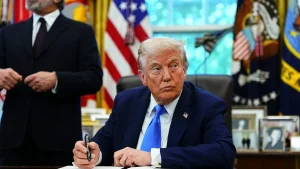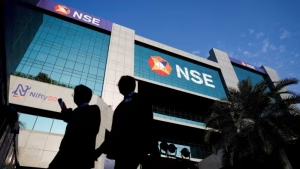New Delhi – Indian IT shares fall dramatically following President Donald Trump‘s announcement of a substantial increase in H-1B visa application fees, creating immediate concerns for the country’s $283 billion technology services industry. The Nifty IT index dropped 2.7% in Mumbai trading as investors responded negatively to the potential disruption facing India’s largest outsourcing companies.
The Indian IT shares fall affected major industry leaders including Tata Consultancy Services, Infosys, HCLTech, and Wipro, with all companies declining by similar percentages. This market reaction reflects deep concerns about the financial viability of deploying Indian professionals to US client sites under the new fee structure.
Trump’s $100,000 H-1B Visa Fee Announcement

President Trump’s Friday announcement imposing a $100,000 fee on skilled foreign worker visas has directly triggered the Indian IT shares fall, as the program heavily relies on these visas for sending staff to work in the United States. Indian citizens account for more than 70% of H-1B visa holders, making this policy change particularly impactful for the technology sector.
The dramatic Indian IT shares fall reflects investor understanding that this fee increase represents a significant cost burden for companies dependent on H-1B visas. The new policy threatens to make on-site assignments less financially viable for many technology service providers, fundamentally altering their business models.
Market Analysis and Industry Impact

According to Devarsh Vakil, head of prime research at HDFC Securities in Mumbai, the Indian IT shares fall resulted from “sudden fee hike has sparked confusion and panic among tech companies and international workers.” The substantial cost increase will make deploying Indian professionals to US client sites for new projects financially challenging.
The Indian IT shares fall demonstrates market recognition that costs of international assignments will surge dramatically under the new visa fee structure. This policy change affects not only fresh applications but also creates uncertainty about the long-term sustainability of the H-1B dependent business model.
Corporate Response and Travel Disruption
The announcement that led to Indian IT shares fall also prompted immediate travel disruption over the weekend as many Indian professionals rushed to return to the US or cancel planned holidays. However, the White House later clarified that new rules would apply only to fresh applications from the next visa lottery in February, not existing H-1B holders.
Major companies affected by the Indian IT shares fall include TCS, which ranks as the second-biggest corporate sponsor of H-1B petitions. The policy also impacts thousands of employees at American companies like Amazon, Microsoft, and Apple who use the H-1B program extensively.
Industry Adaptation and Local Hiring Trends
Despite the Indian IT shares fall, industry analysts note that Indian outsourcing companies had been steadily expanding US recruiting following Trump’s previous term restrictions on foreign workers. Nasscom, the Indian IT and tech industry trade body, emphasized that companies have been reducing visa reliance through increased local hiring.
The Indian IT shares fall occurs despite industry efforts to adapt to changing visa policies. About one-fifth of the industry’s workforce is based in the US, with 20 to 30% of these employees on H-1B visas, representing approximately 3 to 5% of a typical company’s total workforce.
Diplomatic Tensions and Trade Relations
The policy change causing Indian IT shares fall is likely to deepen tensions between Washington and New Delhi, coming after Trump already imposed 50% tariffs on Indian goods citing the country’s trade in Russian oil. India’s external affairs ministry warned that the visa change was “likely to have humanitarian consequences by way of the disruption caused for families.”
Also Read: GST 2.0 Rollout: Massive Modi’s Rs. 2.5L Crore Savings Festival Begins
The Indian IT shares fall reflects broader concerns about deteriorating India-US business relations under Trump’s policies. These visa restrictions add another layer of complexity to bilateral trade relationships already strained by tariff disputes.
Legal Challenges and Future Outlook


Financial analysts at Motilal Oswal suggest that while Indian IT shares fall in the immediate term, current visa applications appear secure. They believe Trump’s directive is “likely to be challenged in US courts and may not survive in its current form,” providing some hope for industry recovery.
The Indian IT shares fall may prove temporary if legal challenges successfully modify or overturn the fee increase. However, the policy uncertainty creates ongoing challenges for business planning and investment decisions in the technology services sector.
Industry Resilience and Innovation Focus
Nasscom’s response to the Indian IT shares fall emphasized that “high-skill talent is vital to driving innovation, competitiveness and growth for America’s economy.” The organization noted that the decision would disrupt “business continuity for onshore projects which may require adjustments.”
The Indian IT shares fall highlights the industry’s vulnerability to visa policy changes, but also demonstrates the critical role Indian technology professionals play in the US economy. Companies must now navigate increased costs while maintaining service quality and competitiveness in their largest international market.

